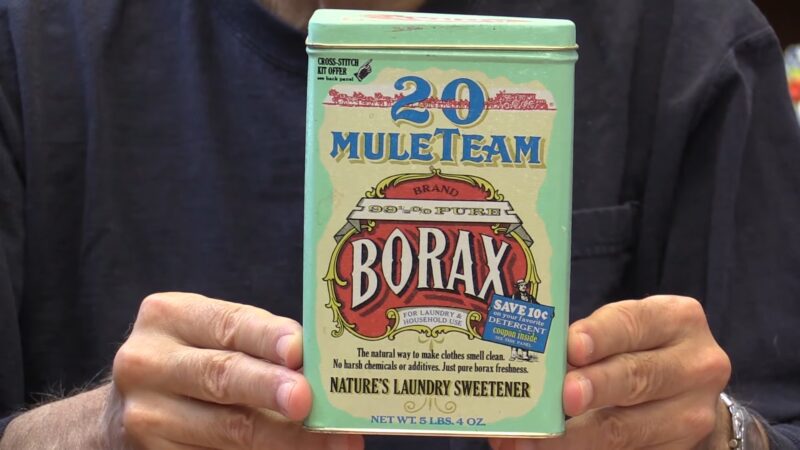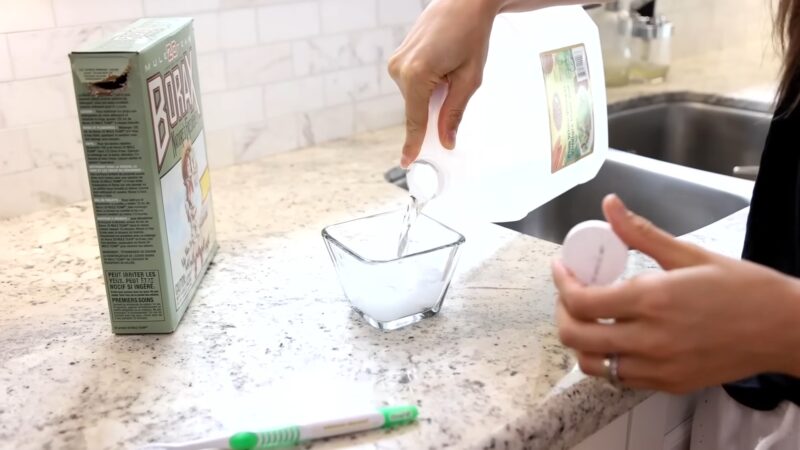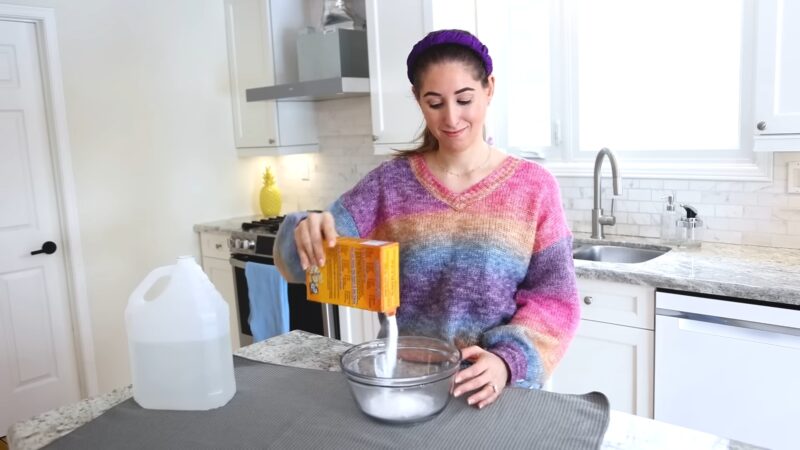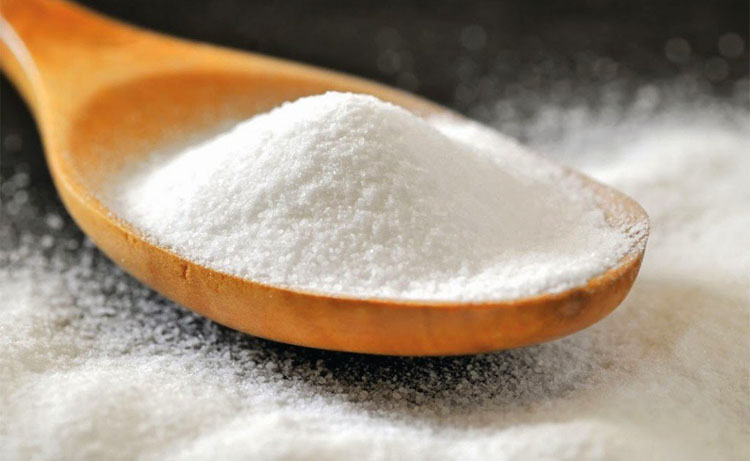For years people have recommended Borax as a safe and natural cleaning solution as an alternative to harsher traditional cleaners. It’s also used a lot for other things like a non-toxic pest solution, to clean carpets, and even as an ingredient in slime for kids.
But is Borax actually safe? Some say it is completely safe and others swear you should never use it. So we decided to do the research and figure out if Borax is a product we should be using in our everyday lives. We found that there are some issues associated with it, but there are ways it could be used safely in particular circumstances with the right precautions.
Keep reading to learn more about Borax and it’s safety, as well as some alternatives you can use instead!
Overview
Borax, or otherwise known as sodium borate, is a natural mineral mined from the Earth that is most commonly found as a white powder. It’s most notably characterized as being a good emulsifier, preservative, and buffering agent. It’s also known for being a great disinfectant, getting rid of stains, whitening clothes, and neutralizing hard water.
Because of these properties Borax is often found in common household products like laundry detergents, soaps, and degreasers. It’s also found in topical medicine, food preservatives, pesticides, and other industrial uses because Borax can inhibit the growth of bacteria and mold, increase resistance to heat and chemicals, kill insects, and helps balance acidity.
Is Borax safe?

Since it is considered a natural product, it pops up in a lot of DIY recipes for various tasks around the house. However, just because it is deemed as natural that does not mean it is considered safe. Borax comes in many forms but you’re most likely to handle it in its powder form for cleaning or for doing laundry. As a powder, borax has been known to be a skin and eye irritant because it can easily travel through the air and be inhaled or get in the eyes of anyone close by.
Borax has also been associated with reproductive issues, endocrine disruption, and developmental issues from exposure to any of its forms. It’s worth noting that most of these health problems were found in rats that were exposed to pretty high doses of Borax, so this probably means that the average person won’t come into contact with enough Borax to be very dangerous, but you should still take caution when handling it in your everyday life.
It’s also important to look at some of the other uses for a product when determining it’s safety. In the case of Borax, one common use is as a pesticide. To kill certain pests, Borax is found as either a powder, which sticks onto the insect’s body and then they ingest it from cleaning themselves, or it is mixed into food bait that the insects ingest directly.
The Borax will build up in their system inhibiting their metabolism and reproductive system causing them to die. Borax is also really good at breaking down and destroying the exoskeletons of some insects because the powder is very abrasive to them. Insects like ants are much smaller and more fragile than us, however, it is slightly concerning that Borax, a product we use relatively often in our homes, can be used as a pesticide as well.
Not only is Borax used as a pesticide, but it is also used as a cooling agent, adhesive, anti-freezing agent, building materials, and so many other industrial uses. Most of these chemicals and products are usually not associated with good human health so it is something to keep in mind when using Borax to clean around the house.
How to Use It Safely

Borax has been known to have some negative health consequences when exposed to high levels over time and is lethal if ingested at high doses in animals and humans.
Because of this, it is best to limit our exposure which means that it’s probably okay to be using it every once in a while, but we do not recommend using it for all of your cleaning and household purposes. If you are planning to use Borax for different tasks around the house, we found some ways you can stay safe and avoid any health issues.
- Keep the area where you are using Borax well-ventilated by turning on a fan or opening a window.
- Wear long sleeves and pants to prevent Borax from getting on your skin because it could irritate.
- If you spill any Borax on your clothes make sure to take them off right away and wash them. This goes for spilling Borax on anything, clean it up right away!
- Use glasses or even goggles to prevent any Borax dust from getting into your eyes.
- Try to keep the Borax far away from your face so you don’t breathe it in. Avoiding dust is the best thing to do!
- Keep the Borax container tightly closed when you’re not using it.
- Try to not use it every day, just every once in a while.
- Vacuum up the floor of anywhere you used Borax in case any dust settled onto the ground.
- Do not ingest any Borax because it can be lethal at certain doses. This goes for children as well, keep the box out of their reach at all times (2).
Alternatives

As we mentioned, a lot of DIY cleaners and laundry detergents call for Borax. Because it can be a skin and eye irritant we wanted to give you some alternatives you could use instead if you are concerned about using it in your homemade products. We included some other homemade cleaners you can use instead, as well as some store-bought all-purpose cleaners that we love!
- Vinegar: Distilled white vinegar is a great disinfectant and deodorizer, making it a great alternative to Borax’s disinfectant qualities.
- Baking soda: It is a natural and safe deodorizer, as well as, a mild abrasive that can help scrub off tough messes and stains.
- Non-chlorine bleach: Non-chlorinated bleach is a much safer alternative to traditional bleach and is a great disinfectant.
- Washing soda: Washing soda is a popular cleaning additive that is great for removing stains, dissolving grease, softening water, and getting rid of unpleasant smells.
- All-purpose cleaners: Instead of making something at home, check out some of the eco-friendly all-purpose cleaners we love!
Frequently Asked Questions (FAQs)
Can Borax be used safely around pets?
While Borax is less toxic than some commercial pesticides, it can still be harmful to pets if ingested or if they come into contact with it. It’s best to use it cautiously and keep pets away from treated areas until the Borax has been cleaned up or settled.
Is there a difference between Borax and boric acid?
Yes, they are different compounds. Borax is a salt of boric acid but less acidic than boric acid. While both are used in similar applications, their chemical properties and safety profiles differ.
Can Borax be used in organic gardening?
Borax is a natural substance but isn’t always suitable for organic gardening due to its potential toxicity to plants in high concentrations. It’s important to follow guidelines for organic gardening when considering its use.
Is Borax safe for septic systems?
In small quantities, Borax is generally safe for septic systems. However, large amounts can disrupt the bacterial balance in the system, so it should be used sparingly.
How should Borax be stored for safety?
Store Borax in a dry, cool place, away from children and pets. Keep it in a clearly labeled, sealed container to avoid accidental ingestion or confusion with food products.
Can Borax be used for personal care products?
Though Borax is sometimes used in homemade personal care products, its safety for such uses is questionable, especially given its potential as a skin irritant. Alternative natural ingredients are recommended.
Are there environmental concerns associated with mining Borax?
Yes, like any mining activity, Borax mining can impact the environment. It involves altering landscapes and can lead to water and soil pollution if not managed responsibly.
Conclusion
While Borax is a versatile and natural product with numerous household applications, its safety is not black and white. It’s important to handle Borax with care, using it sparingly and with appropriate precautions to minimize health risks. For those concerned about its safety, there are several effective and eco-friendly alternatives available for cleaning and household tasks.
